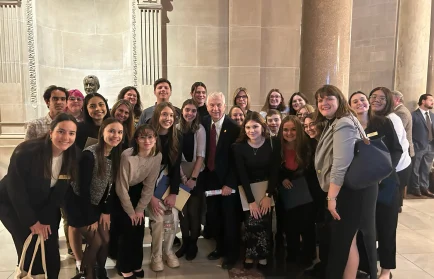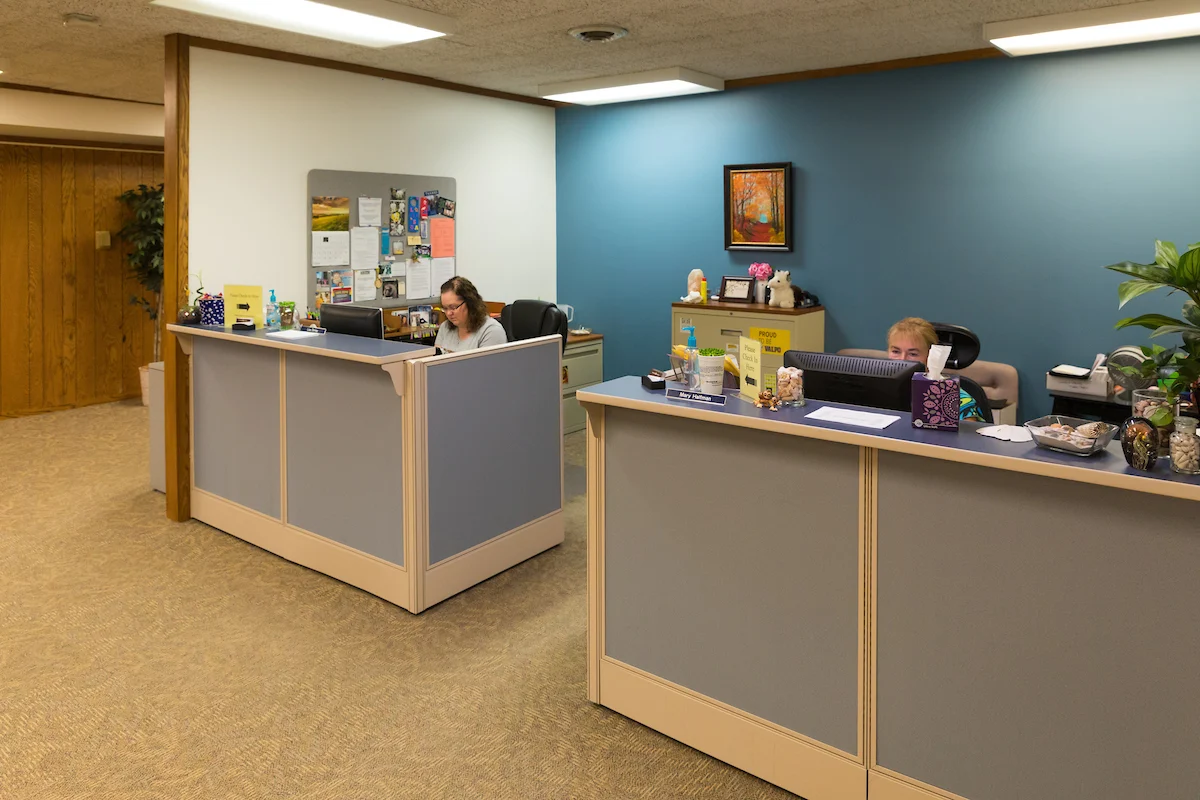Resources For Parents and Loved Ones
Guidance for Parents and Loved Ones
Our goal is to provide you with resources that may help you in supporting your student. We believe that you may find useful information and resources contained in the links below. Please feel free to contact us should you have any further questions.
Young men and women enter college at an age when they are beginning to go through a number of important changes. The late adolescent/early adult is usually concerned about establishing independence, occupational and social identity, and working out a code of values and personal morality. The transition to college provides a new environment and living situation which accentuates these processes.
However, these changes are not always smooth and may require some adjustments in parenting skills. It is not atypical for college freshmen to go through mood swings, from very excited to very discouraged. Many students experience feelings of homesickness during their first term. It is helpful to provide these students with support and give them time to gain a sense of security in their new environment. Many other students will react in the opposite way and not wish to visit home as a means of demonstrating to themselves and their friends their independence and good adjustment to college. Parents may need to negotiate their needs for more contact with this latter type of student. Almost all new college students feel that they become more adult, and voice a desire to have their parents interact with them in a more adult-to-adult fashion rather than the previous parent-to-child interaction. They will, however, still occasionally want to receive a large dose of nurturance.
Parents can help facilitate the adjustment of their student to college. It is important to simply listen to students’ successes and concerns. Students find it helpful to have their parents specifically focus on their efforts as well as their accomplishments. It is also helpful to be patient, supportive and encourage students to come up with their own solutions. Suggestions should be withheld unless they are specifically requested. Finally, parents should encourage the use of the various campus student services and focus on nonacademic experiences as well as on grades and course progress.
Parents can expect to experience some positive and negative emotions themselves. Some of these feelings will be tied to their own concerns about their student, but many feelings are more related to the changes in their own life situation. Some helpful ideas for parents are to develop a support network, reexamine their allocation of time to work, family and leisure, and to work on developing an adult-to-adult relationship with their college aged student.
Suggested additional readings:
- Lecture Notes: A Professor’s Inside Guide to College Success, by Freeman (2010)
- How To Survive in an Empty Nest: Reclaiming Your Life When Your Children Have Grown, by Lauer (1999)
- Almost Grown: Launching Your Child From High School to College, by Pasick (1998)
- Empty Nest, Full Heart: The Journey From Home to College, by Van Steenhouse & Parker (1998)
- When Kids Go to College: A Parent’s Guide to Changing Relationships, by Newman & Newman (1994)
- Letting Go: A Parents’ Guide to Today’s College Experience (5th ed.), by Coburn & Treeger (2009)
- Don’t Tell Me What to Do, Just Send Money: The Essential Parenting Guide to the College Years, by Johnson & Schelhas-Miller (2000)
- When Your Kid Goes to College: A Parent’s Guide, by Berkin (1998)
- The Launching Years: Strategies for Parenting from Senior Year to College Life, by Kastner (2002)
- Letting Go (5th ed.): A Parent’s Guide to Understanding the College Years, by Levin-Coburn (2003)
- I’ll Miss You Too: An Off-to-College Guide for Parents and Students, by Bane & Bane (2006)
- You’re On Your Own (But I’m Here If You Need Me): Mentoring Your Child During the College Years, by Savage (2009)
- The Naked Roommate: And 107 Other Issues You Might Run Into in College, by Cohen (2011)
Counseling Information
Full-time undergraduate and DARC students who are currently enrolled are eligible for services. There is no charge for counseling.
For more information regarding our services please go here. For more information on how students can schedule a triage consultation appointment, please go here and navigate to the “your first appointment” accordion tab.
Our professional staff can be available to you for consultation by calling our office at 219.464.5002 and asking to speak to a therapist. If a therapist is not available at the moment, we will take your information and the next available therapist will contact you. We are happy to offer support and suggestions to you within the bounds of client confidentiality as you try to help your student get the help they may need. We view you as critical partners in encouraging your student’s well-being.
We certainly understand that you may be concerned about your student, and want to know about the services that they may be receiving with us. While we are glad to talk with you and to take any insights or information you may have, we are required to maintain confidentiality of the student in accordance with our legal and ethical standards. This means that we cannot share any information with parents or loved ones, including whether your student has scheduled or attended an appointment with us, unless the student has provided written permission for us to do so.
For more information regarding our confidentiality policy, please go here and navigate to our FAQs.
Frequently Asked Questions
If your student only requires medication, they can call us in order to discuss referral options. We provide psychiatric medication services only to students who are also receiving counseling services from us. For students like your son/daughter, we can help by sharing the contact information to providers within our local community. Students may also be able to receive medication monitoring services at the Student Health Center on campus, though this is provided on a case-by-case basis.
This was developed by the Valparaiso University Counseling Center staff, with thanks to the University of Michigan Counseling and Psychological Services for some helpful information.
We recommend that you express to your son/daughter your concerns in a straightforward, yet loving and supportive way. It might be helpful to say something like, “I’m worried about you. You just don’t seem to be yourself lately. Have you thought about going to talk to someone about your concerns? I think it would be really good for you to talk with someone who can help you sort out whatever is bothering you. Will you call the Counseling Center to make an appointment?”
This was developed by the Valparaiso University Counseling Center staff, with thanks to the University of Michigan Counseling and Psychological Services for some helpful information.
Everyone feels upset at times. However, if you observe some of the following with your student, we encourage you to talk to them about receiving help from us. While this list is not intended to be exhaustive, we hope that it provides you with some information regarding “warning signs.”
- Dramatic mood swings
- Panic attacks or excessive worrying
- Marked difficulty with concentration
- Changes in sleep or appetite
- Alcohol or other drug abuse
- Recent losses (e.g., death of a loved one, relationship breakup)
- Loss of interest in hobbies, friendships, and schoolwork
- Increased conflict with family and loved ones
- Isolation from family and friends
- Feelings of hopelessness or helplessness
The option to seek help is ultimately up to the student. If they are reluctant to make an appointment with us, we encourage you to continue to be supportive, allow for some time to pass, then bring it up again if you are still observing signs of emotional distress. You may also contact us for a consultation, and we can offer you support and possibly other strategies for encouraging your student to seek help. If you are concerned about the immediate safety of your student (e.g., threatened or attempted suicide), or with the safety of individuals around them (e,g, threats of violence to others), please call 911 for immediate help.
This was developed by the Valparaiso University Counseling Center staff, with thanks to the University of Michigan Counseling and Psychological Services for some helpful information.
COunseling Center
Meet Our Staff
We are a team of counselors and graduate-level trainees, and we are committed to working with the broad range of concerns associated with college life. We will offer services within the scope of our licensing, credentials, and training as well as within the capacity of a university setting.
In instances where a student’s needs are such that they require more specialized or comprehensive treatment, we will make the appropriate community referrals. Please know that we do not make such referrals because we are unwilling to help a student. Rather, we do so in attempt to ensure that a student will receive the help that they deserve from a provider who is best able to offer it.
Explore More
Contact us
Get in touch with our Counseling Center located at Alumni Hall (North side of building).
Fax: 219.464.6865
Counseling Center
219.464.5002
counseling.center@valpo.edu
1602 LaPorte Ave.
Valparaiso, IN 46383
Counseling Center (CC)








